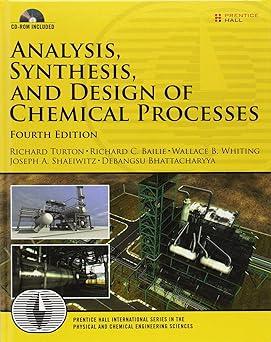It is known that for a certain second-order, elementary, gas-phase reaction, the rate of reaction doubles when
Question:
It is known that for a certain second-order, elementary, gas-phase reaction, the rate of reaction doubles when the temperature goes from \(220^{\circ} \mathrm{C}\) to \(250^{\circ} \mathrm{C}\). If the rate of reaction is \(5 \mathrm{~mole} / \mathrm{m}^{3} \mathrm{~s}\) at the base conditions, which are \(10 \mathrm{~atm}\) pressure and \(225^{\circ} \mathrm{C}\), and the feed is pure reactant (no inerts), answer the following questions:
a. Compared to the base case, by how much does the rate of reaction (at inlet conditions) change if the temperature is increased to \(245^{\circ} \mathrm{C}\) at constant pressure?
b. Compared to the base case, by how much does the rate of reaction (at inlet conditions) change if the pressure is increased by \(10 \%\) ?
Step by Step Answer:

Analysis Synthesis And Design Of Chemical Processes
ISBN: 9780132618120
4th Edition
Authors: Richard Turton, Richard C. Bailie, Wallace B. Whiting, Joseph A. Shaeiwitz, Debangsu Bhattacharyya





